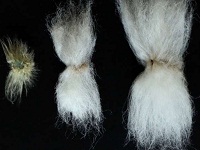"The new research led by Z. Jeffrey Chen at The University of Texas at Austin might offers a break for the industry. He with his team have taken the first step toward a new way of breeding heartier, more productive cotton through a process called epigenetic modification."

The new research led by Z. Jeffrey Chen at The University of Texas at Austin might offers a break for the industry. He with his team have taken the first step toward a new way of breeding heartier, more productive cotton through a process called epigenetic modification.
Talking about the epigenetics in recent decades, scientists have discovered that many traits in living things are controlled not just by their genetics what's written in the code of their DNA but also by processes outside their DNA that determine whether, when and how much the genes are expressed, known as epigenetics. This opens up the possibility of entirely new ways to breed plants and animals. By selectively turning gene expression on and off, breeders could create new varieties without altering the genes.

The researchers identified more than 500 genes that are epigenetically modified between wild cotton varieties and domesticated cotton, some of which are known to relate to agronomic and domestication traits. This information could aid selection for the kinds of traits that breeders want to alter, like fiber yield or resistance to drought, heat or pests.
Chen, the D. J. Sibley Centennial Professor of Plant Molecular Genetics in the Department of Molecular Biosciences says that this understanding will allow everyoneto supplement genetic breeding with epigenetic breeding asthe epigenetic changes will affect flowering and stress responses, you could reactivate stress-responsive genes in domesticated cotton.
In a study, Chen and his colleagues at Texas A&M University and Nanjing Agricultural University in China report they produced a "methylome" a list of genes and genetic elements that have been switched on or off through a natural process called DNA methylation. This methylome covers the most widely grown form of cotton, while showing how these plants changes more than a million years. The researchers discovered changes in DNA methylation occurred as wild varieties combined to form hybrids, the hybrids adapted to changes in their environment and finally, humans domesticated them.
Chen says modern breeders can modify gene methylation with chemicals or through modified gene-editing technologies such as CRISPR/Cas9. These methods could allow breeders to make targeted changes to a plant's epigenome and create new breeds with improved traits.












